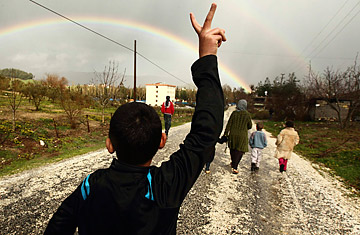
Hassan Saad, 13, who fled Idlib in Syria, flashes a victory sign while walking outside the refugees camp near the Turkish-Syrian border in the southeastern city of Yayladagi Feb. 16, 2012. Hassan said that his father was killed by the Syrian army five months ago.
"People want freedom, Bashar leave... Freedom is beautiful, Bashar go to the moon, we need freedom," the man sings feebly, in a teenager's untrained voice, trying to keep rhythm with his arms, one covered in bandages, the other connected to a drip. He is a munshid al-thawra, a singer of the revolution, he says, and this is his favorite song, the one he would usually bellow to the swelling crowds during the protests back home. Home, till now, had been a village near Hama in Syria. Today, it is a hospital bed in Antakya, across the border in Turkey.
He is a handsome kid, just turned 18, his eyes dulled by the medicine but unmistakably alert, a crop of dark hair framing his smooth, evenly chiseled face, one of the few parts of his body not riddled with shrapnel. Of his left leg, the only flesh exposed to the elements is a row of misshapen, iodine-stained toes, which sprout, like black-orange mushrooms, from beneath thick folds of bandage and gauze. All that remains of the right leg is a stump. For all he knows, the rest of it, sheared off by shrapnel from a mortar shell, lies among the debris of his family home.
The munshid arrived in Antakya on Feb. 23, a few days after the Syrian army's attack on his village. He recalls only small, disjointed parts of his journey to Turkey. He was unconscious most of the time, he says, and given morphine whenever he awakened. The pain was unbearable; the wounds on his one remaining leg so deep that he could often see the white of the bones beneath. He arrived from Syria on the back of a tractor, he remembers, before being picked up by Turkish border guards and rushed into an ambulance.
In the past week alone, according to an official from the Turkish ministry of foreign affairs, about 300 Syrians have fled into Turkey, bringing the total number of refugees settled in the camps around Antakya to 10,789 (as of March 2). With the Syrian army intensifying its attacks in the north of the country, particularly in Idlib province, a region bordering Turkey, more are expected to follow. Anticipating the increase, Turkish authorities are planning to free up room for at least another 10,000 refugees.
A group of seven men from Jabal al-Zawiya, a part of Idlib, has just arrived at the Altinozu camp, halfway between Antakya and the Syrian border. At a teahouse outside the camp, they recount harrowing details of a Syrian military attack on Abdita, the home village of Riad al Asaad, the Turkey-based leader of the rebel Free Syrian Army.
"Usually, the [Syrian] army attacks with tanks first. This time around they moved in with the infantry," says one of the men, a 38-year old marble-factory owner, visibly drained from three days of travel, most of it on foot. "The soldiers knew the houses to go to, and they killed the young men there immediately." According to the Syrian Observatory for Human Rights, at least 33 people died in the attack.
A young farmer, seated opposite the factory owner, passes me his cell phone. A video allegedly recorded after the massacre — hands sorting through a pile of bloodied corpses — begins to play.
"The army has been here for seven months, but they've never been as aggressive as now," the factory owner says. "The mukhabarat [the state security forces], they attacked my house seven times, they robbed my home. They told my nine-year old boy they would kill his father." On his way out back to the camp, he fires what he must imagine to be the most severe piece of invective that the Damascus regime can merit. "We'd rather accept Israel than Bashar," he says. "The Israelis didn't do to the Palestinians what Bashar has done to Syria."
Back at the hospital, the munshid fumes against the outside world's lack of resolve in Syria. "Everyone is against us, we only have Allah to help us," he says. "We aren't afraid of anything, we'll fight the regime until it collapses," adds a man lying in the bed next to his. "We're not afraid of bullets or tanks."
The munshid tries to sit up to sip from a cup of water. Helped by a friend, he finally succeeds, his boyish face crumpling under sharp twinges of pain. "I will come back to Syria," he says, "stand on one leg and sing."
